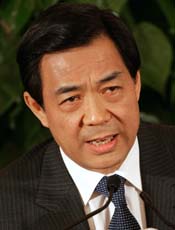New York, April 25, 2012–The U.S.-based, Chinese-language news website Boxun has come under two crippling denial-of-service attacks in the past week as the outlet sought to report on the unfolding murder and corruption scandal involving former senior Communist Party leader Bo Xilai. The attacks forced Boxun to change its hosting company twice, the site’s founder and editor Watson Meng told the Committee to Protect Journalists.
Meng, who spoke to CPJ from his home in North Carolina, said he had not been able to trace the source of the denial-of-service attacks but believed they were in reprisal for Boxun‘s reporting on Bo Xilai and his ally Zhou Yongkang, the Communist Party’s security chief, whose political fate has also been the subject of speculation this month. The first attack, on Friday, was so severe that it not only threatened Boxun but its entire hosting service, name.com. Denial-of-service attacks overload host servers with external communications requests, thus preventing websites from functioning.
Bill Mushkin, chief executive of name.com, told The Associated Press that the attack followed an e-mailed demand that his company disable Boxun and cede control of the site to hackers. Labeling the attack a “strong arm tactic,” Mushkin and his company helped Boxun move to another host, enom.com, but a second attack followed that forced yet another server relocation. Enom.com did not immediately respond to CPJ’s request for comment.
The Bo Xilai scandal has been one of the most sensitive topics in recent memory in China. The Chinese microblog service Sina Weibo, apparently responding to pressure from propaganda officials to contain public speculation concerning the case, announced Tuesday that it had closed several user accounts on accusations of “rumor-mongering.”
“Efforts to silence discussion of the Bo Xilai scandal are self-defeating,” said Bob Dietz, CPJ Asia program coordinator. “As the Communist Party prepares for leadership change amid this burgeoning scandal, its credibility would be enhanced by greater transparency rather than these desperate attempts to conceal news from the public.”
Sina’s announcement was distributed as a warning to some users registered with the service. Sina named some of the shuttered accounts in its message, including one belonging to financial journalist Li Delin, who has been missing since late March. The Wall Street Journal reported that Li had been detained after he reported on his personal Weibo account that he saw tanks in Beijing in the wake of Bo’s ouster–one of many online stories that triggered rumors Bo had attempted a coup.
The U.K.-based Financial Times reported that another of the shuttered accounts belonged to Wu Guancong, a businessman from Guangzhou, who has also been in police custody since March 25. Sina Weibo deletes unsanctioned posts and it is not clear what information Wu shared that caused his arrest. Owners of the deleted accounts had been “dealt with by public security organs,” Sina said in the message, without providing more details, according to a translation by the Journal.
Internet officials have already detained at least six individuals and closed dozens of websites since Bo’s downfall, all in the name of limiting unconfirmed reports, according to state media accounts, which did not list the individuals or the websites involved. Weibo and rival microblog service Tencent QQ suspended comment functions for three days earlier this month, in what Xinhua news agency characterized as a punishment for allowing rumors to spread.
